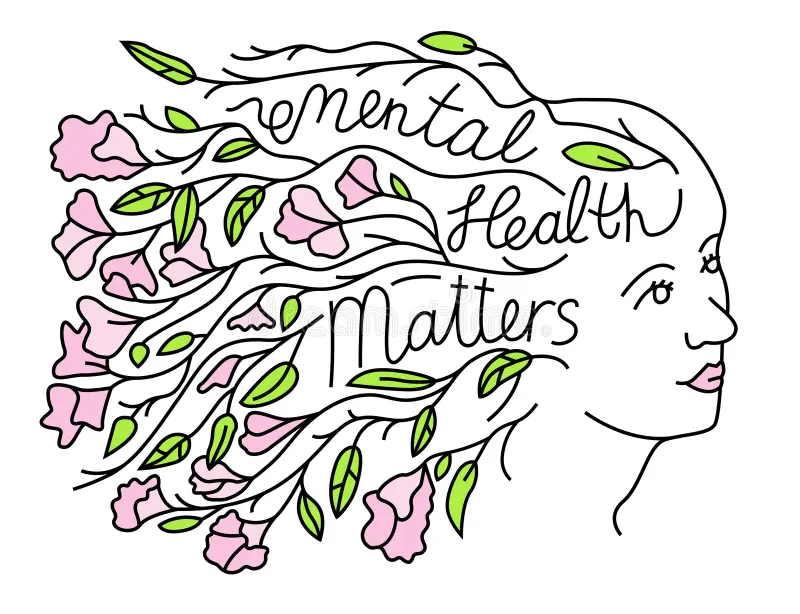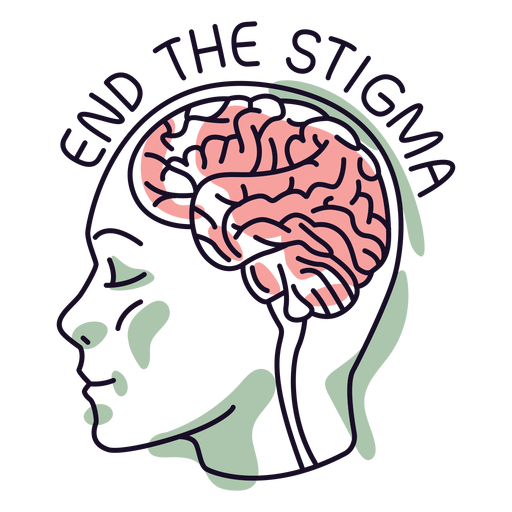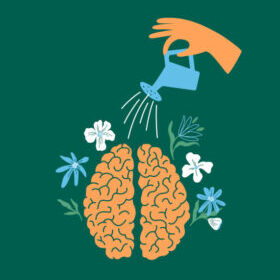Why is mental health awareness important?
Mental Health Awareness Month is a yearly reminder of how important our mental health is and that we all deserve compassion and awareness regarding our mental well-being. Mental health is something that affects everyone, and depending on how our mental health is doing, it impacts those who are in our lives. The awareness of mental health has been growing recently, however, there is still a lack of knowledge, support, and resources when it comes to mental health, and there is often a stigma that follows people with mental health conditions. There are still a lot of improvements to be made when it comes to providing all-inclusive care and breaking stigmas to make sure that those who are struggling with their mental health receive the empathetic and compassionate care that they deserve.


Breaking the Stigma
Stigma is based on prejudice and negative generalization and is an unfortunate common occurrence for those who are struggling with their mental health conditions, causing those who are struggling to feel embarrassed, ashamed, or misunderstood by pre-existing stigmas. Stigmas toward mental health issues can cause an individual who is struggling to isolate and make them feel discouraged towards seeking treatment, which can cause them to have a lower quality of life and struggle to find resources and support.
Individuals who have a mental illness can struggle with discrimination and prejudice in several areas of their lives from people who have a negative bias and misunderstanding towards those who have a mental illness. This can affect them in their relationships and even expand into their work life. In return, this can increase people with mental health issues to increased isolation and a lack of support as they struggle with their relationships due to the misunderstanding and prejudice towards mental health conditions. This can cause those who need help to feel like they shouldn’t look for help out of fear of being judged. Having more mental health awareness can help break the stigmas associated with people who are struggling with their mental health, which can help them in multiple areas of their lives.
Increased Mental Health Knowledge
Mental health awareness month offers a unique opportunity to spread more information about mental health and how it affects our loved ones. By increasing knowledge and education on mental health conditions, we reduce the amount of stigma and negative bias associated with people who are struggling with their mental health. Without Mental Health Awareness Month, there would not be as much general knowledge about how mental health works, which helps many people understand and empathize with what others are going through.
With the education that is provided in Mental Health Awareness Month, we are also able to learn more about the signs that could indicate someone is struggling with their mental health or a mental health disorder. When we learn the different signs associated with psychological conditions, we can spot them in our loved ones and figure out when to support them and find the help they might need. We can also learn more about the various types of therapy available, such as CBT, exposure therapy, and talk therapy. Having more awareness of their signs and the different types of therapy could be what helps us prevent the unfortunate situations that can happen when disorders and declining mental health go untreated.
Being able to know what kind of treatment you or someone in your life might need can be confusing sometimes, but with the awareness of mental health, we can learn more about what kind of treatments and therapy someone might need. By being able to know more signs of mental illnesses, we can determine what the best course of action for treatment is. It can also help people who are supporting the person with the mental illness have a better understanding of the different disorders and navigate how to support them effectively. The education mental health awareness month also allows people to learn that it is common for people to go through mental health challenges and that they are treatable.


Fostering Support
When we have more awareness of mental health and how it affects us, we can empathize more with those who are struggling. Without knowing how mental health conditions affect our daily lives, we are not able to look at their perspective on what they are going through. Mental health awareness month creates opportunities to see and hear from people who are struggling with their mental health so that we can understand what their experiences with mental health have affected them and what they think has helped them the most.
The awareness also creates more opportunities for inclusivity. This is because when we understand something, we can be more welcoming and supportive. It can also create more connections between those who are having a hard time with their mental health and create an environment that supports them and feel safe enough to open up about their experiences. It also allows people from diverse backgrounds to gain access to treatment and interpersonal support without having to stress about being judged or discriminated against. Having awareness and prioritizing people's mental health can help create more empathetic, inclusive, and diverse communities.
Mental health awareness has already helped create more support for those who are struggling by making important changes to schools and the workplace. In the workplace, there have been changes made that help people balance their mental health with their work life by offering EAP (employee assistance plan), mental health days, and allowing more flexibility in their work arrangements. Schools have been able to incorporate mental health education into their curricula, providing counselors and offering education programs for those who require special education. Being able to have these improvements helps create more inclusive and supportive environments that can help people with mental health issues feel supported and understood, which helps their well-being.
Provides Resources
Mental health awareness month also allows resources to be shared, one of the most common being crisis hotlines that you can call or message to talk about what you are struggling with. These crisis hotlines allow you to remain anonymous while getting support for the crisis that you are going through. There are several available that vary depending on what crisis you are currently struggling with. These are especially valuable to those who don’t have personal support in their lives and might be the only resource they have to help them.
One of the aspects of these crisis hotlines that can be particularly helpful is their ability to help you find affordable and sometimes free therapy. There are also online tools provided in the awareness campaigns that can help you find the right therapists. Mental health awareness also has helped different support groups to be created, the groups also can vary depending on what you are struggling with and offer a chance for you to get support in a group setting where you can connect with others who are struggling through similar situations as you and help create a sense of community. Making more resources available through mental health awareness can make it easier and less intimidating for someone to connect to the right therapist for them.
Below is a list of free or low-cost 24/7 mental health and crisis support services available to Utah residents and local support groups.

Crisis Hotlines & Immediate Support
Utah Crisis Line
Call: 988 or 801-587-3000
Hours: 24/7, 365 days a year
Services:
- Free and confidential support.
- Suicide prevention, mental health resources, and crisis information.
- Non-judgmental, compassionate guidance.
RAINN National Sexual Assault Hotline
Call: 800-656-HOPE (4673)
Chat: online.rainn.org
Hours: 24/7
Services:
- Confidential support for survivors of sexual assault.
- Online chat option and access to local resources.
Crisis Text Line
Text: HOME to 741741
Hours: 24/7
Services:
- Support for any crisis via text.
- Common topics include depression, anxiety, and emotional distress.
The Trevor Project (LGBTQIA+ Youth Support)
Call: 1-866-488-7386
Text: START to 678678
Hours: 24/7
Services:
- Free and confidential support.
- Focused on LGBTQIA+ youth experiencing crisis or suicidal thoughts.
Veterans Crisis Line
Call or Text: 988, then press 1
Chat: veteranscrisisline.net
-
For veterans, active-duty service members, or friends and family of service members or veterans.
- Free, confidential support 24/7, 365 days a year.
-
Support for mental health issues, suicidal thoughts, PTSD, substance use, or any personal crisis.
-
Can connect veterans to local VA resources, counselors, and follow-up services.
Support Groups & Ongoing Resources
NAMI Utah (National Alliance on Mental Illness)
Website: namiut.org | Call/Text: 988 | Chat: 988lifeline.org
- Crisis hotline and mental health information.
- Extensive directory of free support groups.
- Monthly online workshops on suicide prevention:
- Held every 2nd Wednesday, 11:30 AM–1:00 PM.
Utah Pride Center
Website: utahpridecenter.org
- Offers free peer-led support groups for the LGBTQIA+ community, including:
- Queer Women’s Peer Support Group: Mondays, 7:00–8:00 PM.
- Gay Men’s Peer Support Group: Tuesdays, 6:30–8:00 PM.
- Pride in Recovery (LGBTQ+ N.A. meeting): Tuesdays, 7:00–8:00 PM.
- Religious Trauma Support Group: Thursdays, 6:30–8:30 PM.
- Queer Women’s Peer Support Group: Mondays, 7:00–8:00 PM.
Caring Connections – University of Utah College of Nursing Support Groups
Website: nursing.utah.edu/grief-support-groups
- Call 801-585-9522 to join. Advanced registration required.
- Weekly Meetings open to adults experiencing different types of loss, including death of a loved one, child, spouse/partner, suicide, or substance-related death.
- Most groups have a one-time $50 fee; financial aid is available, so cost is not a barrier.
- 8-week sessions, in-person or online.
Support group offerings include:
- General Grief Support Group: For adults grieving the death of a loved one.
- Loss of a Child Support Group: For parents grieving the death of a child.
- Spousal/Partner Loss Support Group: For those grieving a partner or spouse.
- Suicide Loss Support Group: For those grieving a death by suicide.
- Substance Use Loss Support Group: For those grieving a death due to substance use.
The Neurodiversity Clinic – Support Groups
Website: theneurodiversityclinic.com/events
- Offers a variety of free support groups designed to empower and connect. neurodivergent individuals.
- Each group provides a safe, affirming space led by professionals or peers who understand neurodivergent experiences.
- Offers free social clubs to participate in various activities.
